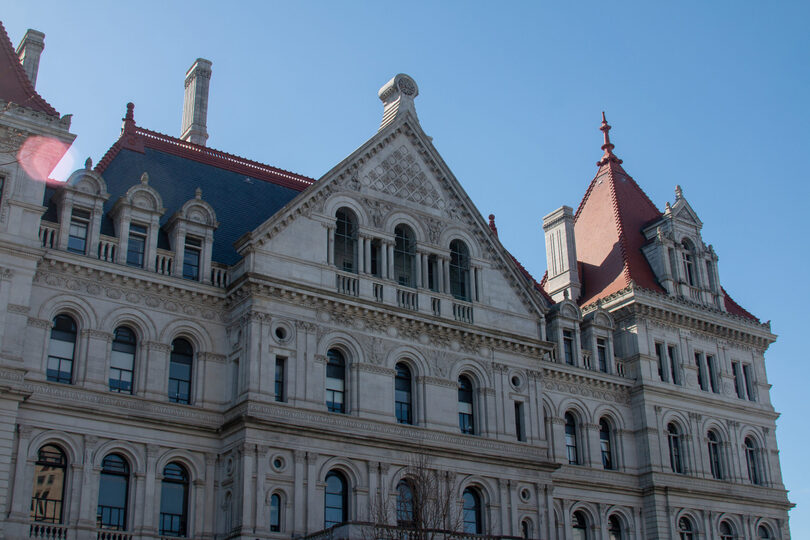New York state assembly passes 3rd extender for Gov. Kathy Hochul’s proposed budget

Meghan Hendricks | Photo Editor
With the passage of Monday's extender bill, lawmakers have three days to reach an agreement before the Monday budget extender expires and halts state operations on April 20.
Get the latest Syracuse news delivered right to your inbox.
Subscribe to our newsletter here.
The state assembly passed its third extender bill on Monday evening to maintain state operations amid stalled budget negotiations. The latest extender, which sets the budget’s deadline as April 20, comes over two weeks after the New York state budget’s original deadline of April 1.
Monday’s three-day extender bill marks a total of nearly $560 million spent to continue general state operations, following a 10-day extender to April 10 and a seven-day extender to April 17. In a March 31 statement anticipating a late budget, New York State Comptroller Thomas DiNapoli laid out the dates the state would need to pass extenders by in order to pay roughly 57,000 employees on institutional payroll in the absence of a finalized budget. But the statement didn’t provide information on dates past April 10.
The central reason for the deadlock is Gov. Kathy Hochul’s plan to change the state’s bail law and diverge from the “least restrictive” standard, which compels judges to set bail at the lowest threshold necessary to control flight risk. As of Monday evening, Hochul and state legislators have reportedly reached a compromise which would scrap the standard for violent felonies ahead of the budget’s new Thursday deadline.
Under the changes, some lawmakers and experts fear higher rates of pretrial incarceration would make racial and wealth disparities in the justice system worse. Just days before the budget’s original due date, a group of over 100 law professors from every law school in New York state — including Syracuse University’s College of Law — released a letter rejecting the plan and calling on lawmakers to continue to resist the changes in budget negotiations.
In her budget proposal for the 2023 fiscal year, Hochul pushed to change standards for pretrial determinations in order to allow judges setting bail to consider factors like danger posed by a defendant. The plan was controversial at that time too, and contributed to last year’s seven-day budget delay. By the end of negotiations, Hochul’s criteria didn’t pass.
After conceding to exclude the measure from the FY 2023 budget, Hochul has not budged on keeping the plan in the FY 2024 budget. If Hochul’s plan is agreed upon by state lawmakers and passed in the final budget, it will shift the 1970s precedent for the purpose of bail as a way to ensure a defendant would return to court to also function as a way to lessen the likelihood of further offense by someone charged with a violent crime.

Jacques Megnizin | Digital Design Editor
State lawmakers have expressed frustration with the delay and the specific issues holding up the budget. In a Twitter statement, state Assemblymember Sarahana Shrestha said that the budget was being “held hostage.”
At a Thursday press conference, Hochul claimed the budget’s delay, and her persistence on issues like bail, are ultimately for the budget’s benefit, and emphasized that the holdup would be worth it.
“The right budget is more important than an on-time budget, and we’ve been working around the clock. My team has not left town… and we’re going to work hard through the weekend.” Hochul said at the press conference.
In a statement to Northeast Public Radio following last week’s extender, State Senate Majority Leader Andrea Stewart-Cousins said Hochul and lawmakers were “very close” to a general agreement. Assembly Speaker Carl Heastie acknowledged bail was central to the delay, but pointed to housing as another main holdup in a statement to the station.
“So, what do I think is the bigger domino? Bail is 1A, housing is 1B. Then I think everything else is an easier path in the budget,” Heastie said.
Hochul’s housing compact has mainly faced criticism from lawmakers and officials that it is not realistic. Officials including Onondaga County Executive Ryan McMahon are maintaining that the plan — which would build 800,000 new homes across the state over the next 10 years — fails to account for logistics, like an increased need for municipal services.
The plan, which has provisions totaling nearly $380 million, would also compel local governments to expand housing stock every three years, by 3% for downstate areas and 1% for upstate areas.
State lawmakers who represent Long Island have expressed disapproval of the decreased agency to regulate housing for localities. In a March statement, State Sen. Jack M. Martins contended that the compact would strip local governments from controlling their own growth and zoning, and called it a “reckless and irresponsible attempt to defy local government control.”
The FY 2024 budget marks the fourth consecutive year that stalled negotiations have caused the state to miss the budget’s annual April 1 deadline. Before that, the FY 2017 budget was 10 days late in 2016. The record for the latest state budget was set in 2004 with a delay of 133 days, closely followed by a 125-day delay in 2010 after months of negotiations.
Lawmakers now have three days to reach an agreement before the Monday budget extender expires and halts state operations on April 20.





